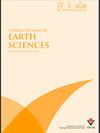超热液系统中的多相变形、流体流动和矿化:从土耳其西北部Kestanelik超热液Au-Ag矿床的结构、矿脉结构和角砾岩推断
IF 1.1
4区 地球科学
Q3 GEOSCIENCES, MULTIDISCIPLINARY
引用次数: 0
摘要
:我们通过对土耳其西北部Kestanelik浅成热液Au-Ag矿床的矿脉结构和角砾岩进行详细研究,研究了浅成热流体系统中的多相变形、流体流动和矿化过程。矿床中的矿化与几个石英脉有关。断层岩脉和I型岩脉具有许多结构和角砾岩特征,这是因为(I)在同震破裂期间形成的构造角砾岩被随后的同震热液角砾岩叠加,以及(ii)通过重复破裂和水力压裂事件对早期脉角砾岩相进行改造。断层脉中角砾岩的空间分布表明,同震热液角砾岩的威力受脉内沸腾水平的距离控制。角砾岩影响沸腾水平附近的整个矿脉;然而,它仅限于静脉在更远端的静脉的上层的下盘接触。矿脉矿化事件数量的变化表明,任何单独的地震事件都只重新开放了一个或多个封闭的矿脉,但不是一次全部重新开放。与I型矿脉相比,断层岩脉中的矿化事件较少,这要么与(I)高流体通量集中到I型矿脉的导管中,以容纳更多的扩张有关,要么与(ii)由于低差应力下的拉伸破坏而导致I型矿脉重新开放有关。尽管断层矿脉记录的矿化事件较少,但与I型矿脉(2.736 g/t)相比,它们的平均Au品位(4.106 g/t)更高。另一方面,与相邻断层相比,围岩结构中较少的矿化事件归因于(i)早期地震事件中损伤带结构的缺失或发育不良,或(ii)由于最佳应力场的旋转导致堵塞后其失活,或(iii)其形成为水力伸展裂缝。本研究强调了对矿脉填充进行详细研究的重要性,以了解浅成热液矿床中矿脉的内部结构演化,这是工业和学术领域地质学家感兴趣的。本文章由计算机程序翻译,如有差异,请以英文原文为准。
Multiphase deformation, fluid flow and mineralization in epithermal systems: Inferences from structures, vein textures and breccias of the Kestanelik epithermal Au-Ag deposit, NW Turkey
: We investigate the multiphase deformation, fluid flow, and mineralization processes in epithermal systems by presenting a detailed study of vein textures and breccias of the Kestanelik epithermal Au-Ag deposit, NW Turkey. The mineralization in the deposit is associated with several quartz veins. Fault-hosted veins and mode I veins share many textural and breccia characteristics owing to (i) overprinting of tectonic breccias formed during coseismic rupturing by subsequent coseismic hydrothermal brecciation and (ii) reworking of earlier vein breccia phases by repeated rupturing and hydraulic fracturing events. The spatial distribution of breccias at fault-hosted veins proposes that power of coseismic hydrothermal brecciation is controlled by the distance to the level of boiling within a vein. The brecciation affects the entire vein proximal to the level of boiling; however, it is limited to the footwall contact of the vein more distally at the upper levels of a vein. Varying number of mineralization events for the veins suggests that any individual earthquake event reopened only one or more sealed vein, but not all at once. Fewer mineralization events in fault-hosted veins compared to the mode I veins is either linked to (i) focusing of high fluid flux into the conduits of mode I veins that accommodate more dilation or (ii) reopening of mode I veins owing to the driven of extensional failure under low differential stress. Although fault-hosted veins record fewer mineralization events, they have higher average Au grade (4.106 g/t) compared to that of mode I veins (2.736 g/t). On the other hand, fewer mineralization events in wall rock structures compared to the adjacent faults is attributed to (i) absence or poor development of the damage zone structures in earlier seismic events or (ii) deactivation of them after clogging due to the rotation of the optimum stress field or (iii) their formation as hydraulic extension fractures. This study emphasizes the importance of detailed studies of vein infill for understanding the internal structural evolution of the veins in epithermal deposits that is interest to the geologists within both industry and academic fields.
求助全文
通过发布文献求助,成功后即可免费获取论文全文。
去求助
来源期刊

Turkish Journal of Earth Sciences
地学-地球科学综合
CiteScore
2.40
自引率
10.00%
发文量
6
审稿时长
6 months
期刊介绍:
The Turkish Journal of Earth Sciences is published electronically 6 times a year by the Scientific and Technological Research
Council of Turkey (TÜBİTAK). It is an international English-language journal for the publication of significant original recent
research in a wide spectrum of topics in the earth sciences, such as geology, structural geology, tectonics, sedimentology,
geochemistry, geochronology, paleontology, igneous and metamorphic petrology, mineralogy, biostratigraphy, geophysics,
geomorphology, paleoecology and oceanography, and mineral deposits. Contribution is open to researchers of all nationalities.
 求助内容:
求助内容: 应助结果提醒方式:
应助结果提醒方式:


